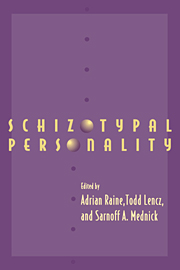Book contents
- Frontmatter
- Contents
- List of contributors
- Preface
- Acknowledgments
- Part I Introduction
- Part II Genetics and neurodevelopment
- Part III Assessment
- Part IV Categorical versus dimensional approaches
- Part V Psychophysiology and psychopharmacology
- Part VI Neuropsychology
- 13 Neuropsychological abnormalities associated with schizotypal personality
- 14 Syndromes of schizotypy: patterns of cognitive asymmetry, arousal, and gender
- 15 Working memory deficits, antisaccades, and thought disorder in relation to perceptual aberration
- Part VII Brain imaging
- Part VIII Conclusion
- Part IX Appendix
- Name Index
- Subject Index
13 - Neuropsychological abnormalities associated with schizotypal personality
from Part VI - Neuropsychology
Published online by Cambridge University Press: 04 August 2010
- Frontmatter
- Contents
- List of contributors
- Preface
- Acknowledgments
- Part I Introduction
- Part II Genetics and neurodevelopment
- Part III Assessment
- Part IV Categorical versus dimensional approaches
- Part V Psychophysiology and psychopharmacology
- Part VI Neuropsychology
- 13 Neuropsychological abnormalities associated with schizotypal personality
- 14 Syndromes of schizotypy: patterns of cognitive asymmetry, arousal, and gender
- 15 Working memory deficits, antisaccades, and thought disorder in relation to perceptual aberration
- Part VII Brain imaging
- Part VIII Conclusion
- Part IX Appendix
- Name Index
- Subject Index
Summary
As more and more evidence has accumulated to support the hypothesis of a genetic basis to schizophrenia (Fowles, 1992; Meehl, 1990), research has turned increasingly toward examining biological mechanisms that may underlie the disorder. Researchers have attempted to isolate neuroanatomical, psychophysiological, cognitive, and neuropsychological impairments in schizophrenics that may be expressions of what Meehl (1990) termed the “integrative neural defect.” This defect is the phenotypic manifestation of the schizogene(s) and is theorized to set the stage for the emergence of psychotic symptomatology. Since such research is etiological in nature, the goal is to identify stable traits that are not merely the by-products of the disease or state-dependent indices of current symptomatology but rather are present irrespective of the waxing and waning of symptoms.
However, basic research into such biological mechanisms in schizophrenic subjects faces a number of potential confounds and obstacles. These include the difficulties of maintaining and assessing motivation and task-focus in actively symptomatic patients. In addition, the effects on dependent measures of neuroleptic medication and institutionalization (often long-term) are not easily teased out. Because of these confounds, research has increasingly turned toward the examination of nonschizophrenic subjects who are at high risk for the disorder. Studying subjects who are schizotypal or hypothetically psychosis-prone has a number of advantages for the identification of psychological, cognitive, and psychophysiological deficits that are vulnerability markers for the disorder. It overcomes the potential confounds mentioned above, as schizotypal subjects are (generally speaking) functionally intact, nonpsychotic, unmedicated, and unhospitalized. Furthermore, replication in schizotypals of deficits found in schizophrenics lends additional support to the hypothesis that such deficits are etiological factors, possibly with a genetic basis.
Keywords
- Type
- Chapter
- Information
- Schizotypal Personality , pp. 289 - 328Publisher: Cambridge University PressPrint publication year: 1995
- 4
- Cited by



